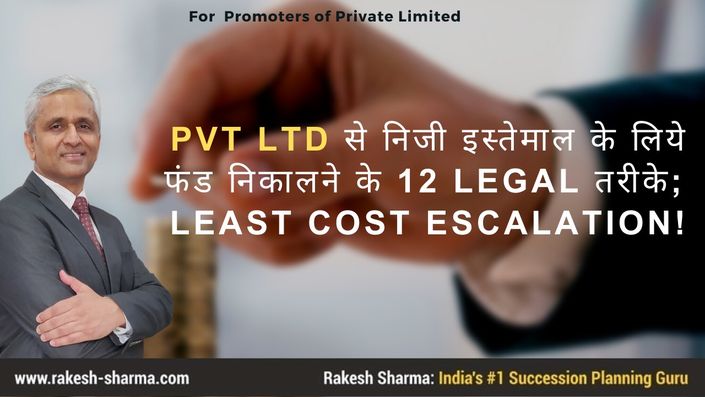
Importance of Family Trust for your Family
A) Family Trust is Exceptionally Safest tool to Family Succession Planning (FSP)
1) Succession planning is a means of securing the interests of the family member/s, successors or legal heirs, providing for specific contingencies, requirements of members of the family or in general plan for devolution of wealth after demise.
2) Succession planning can be done by making a Will and providing for distribution of the wealth as per the wishes of the testator, or setting up a family trust which may be created either during the lifetime of the author (Living Trust) or under a testamentary instrument being the Will (Testamentary Trust).
3) Family trusts are very effective and convenient, and if used prudently can be a great tool not only for succession planning, but also for managing assets, finances and investing in securities and utilising the returns earned by the trust for the benefit of the beneficiaries.
4) A family trust as the name suggests is a vehicle independent of its author or the beneficiaries and therefore enjoys a relatively permanent nature and greater flexibility in terms of managing the assets held in the trust in terms of investing, acquiring, disposing and otherwise dealing with the assets of the trust.
5) A family trust can also be utilised to provide for specific needs of the family, say education or health or travel or marriage and in itself act as a vehicle which holds assets only for that specific purpose, multiplying, safeguarding, managing and securing them for that outlined purpose.
6) Succession planning through private family trust, allows the author to have complete control over the trust and freedom to pass on the assets unto the beneficiaries, which can be set out in the Trust Deed by the author.
7) There is greater flexibility for appointment of Trustee/(s) for managing, maintaining and holding the assets of the trust for the benefit of the beneficiaries. The trustee may be a beneficiary, family member, relative or there can even be a professional trustee appointed for the management of the trust. The author can also be one of the trustees or the managing trustee of the trust.
8) A family trust in the hands of a prudent author can serve not only as an effective tax planning tool but also safe-guarding the interests of family members (who are the beneficiaries) by specifying the management, investments of monies in the trust/ dealing with assets, distribution of assets among beneficiaries, and thereby minimising not just family disputes.
9) Since there is no control by the author over the management and assets of the trust, the assets, held in trust are safeguarded from any action by creditors, and thus, the family members (being the beneficiaries) continue to remain safeguarded in the event of any legal action against the author.
10) Author of the trust, legal transferred the ownership of assets to the trust while continuing to use and enjoy them as long as the trust deed permits. For example, if family home is in a trust, we no longer personally own the house – but we can still live in it if that’s what the trust deed states and the trustees agree.
11) Do you remember about heavy rate of Inheritance Tax, we had; although presently not applicable! Making family trust may save inheritance tax, when applicable…
B) Hey, Don’t forget to Consider the Legal aspect before setting up a Family Trust
1) Taxation: although Family trust normally not created only for Tax Saving: One of the major legal aspects to consider before setting up a family trust is the tax implication which depends upon the structure adopted for creation of the trust. Similarly, the point of incidence of tax will change depending upon the intention and wishes of the author whether to create a specific or discretionary trust. Under the tax regime, tax may be levied in the hands of the author, the trustee or beneficiary depending on the structure and intention of the author.
2) Stamp Duty or transfer fee: Stamping of the instrument of trust will depend from State to State and will also depend on the nature of the trust corpus which may include both movable and immovable property.
3) Management and governance of Trust; who to run TRUST: A trust is governed and managed by the trustees as per the wishes of the author, in terms of the instrument of trust. As the instrument of trust is the charter document, it is important to clearly set out all the powers, responsibilities and liabilities of the trustees, managing trustee (if any), the term of the trustees, qualifications and disqualifications of the trustees in certain situations etc. In case the author is also a trustee or the beneficiary, it may be prudent to fix in certain provisions for safeguarding the other beneficiaries.
4) Can Family Trust be break and ownership of assets be taken back into name author: The author may (considering the purpose of the trust and the tax implications) provide for the type of trust to be created and consideration may be given to certain provisions in which the beneficiaries may also revoke the trust.
5) Trust Deed & Who’s involved
i) Settlor/Author: The person who creates the trust.
ii) Trustees: The people who manage the trust. The settlor can also be a trustee.
iii) It’s also a good idea to appoint an independent trustee who is not a relative.
iv) Professionals like lawyers and accountants (or companies they have set up) often act as independent trustees.
v) Beneficiaries: The people who benefit from the trust, for example members of our family.
vi) Often there is more than one trustee.
vii) There may also be more than one settlor of a trust.
viii) The trust deed will state who has the power to appoint and remove trustees.
ix) The settlor – or anyone else who is named in the trust deed – can have this power. This is an important power that the person can also transfer to someone else in their will or during their lifetime.
x) Trust doesn’t usually end with the settlor’s death.
6) Manage Trust like Managing Company: If a trust is not set up or managed well, there can be considerable inconvenience and cost. There’s the risk of having the trust declared a ‘sham’, which would mean that the assets are not really the trustees’ but are in fact still ours. If the trust is a sham, may lose all of the advantages that were hoping to gain from it, and the trustees may be penalised as well. Once putting assets into a trust, author/settlor no longer personally own or control them. Instead, ownership passes to the appointed trustees, who must act under the terms of the trust deed in the best interests of the beneficiaries.
Forming a trust is a big decision. When going down this route, make sure that it is established properly, for the right reasons, and managed well. Keeping clear records of everything that affects the trust is very important.
7) Getting Advice: Family trusts can be quite technical, so typically need legal, and sometimes accounting, expertise. Trusts should usually be formed by a experts. The expert should be experienced in trust work. Good advice on trusts is important. Get professional advice right from the start. It may seem expensive to get an expert in, but it may cost even more if things are not done well.
C) If no one in family able to manage the affair of Trust than Can Trust be manage by outside Professionals i.e. Corporate Trustee
The concept of a corporate trustee is gaining importance in India; however this concept is mostly restricted to high net worth families who can afford the professional fees of such corporate trustees as in most cases the family members are appointed by the author for ease and convenience. Some benefits of appointing a corporate trustee:
i) All services under one umbrella facilitator who provides a whole range of services from legal, compliance, investments, tax planning and governance and management.
ii) Unlike living persons, corporate trustee being a legal entity has longevity and continuity, this eliminating or reducing the need for frequent appointment of new trustees.
iii) Knowledge and expertise of financial markets, enable better investment in instruments and higher returns on the assets under management.
iv) Some shortcomings of a corporate trustee are:
v) Professional management may result in overexposure of the trust assets.
vi) May result in mismanagement or over stringent management affecting the beneficial interest of beneficiaries.
vii) Certain percentage of monies or funds of the trust being spent as professional fees could otherwise be saved, if a family member or friend having the same knowledge functions as the trustee.
viii) The wishes and needs of beneficiaries may not be adequately considered or provided for, considering the personal touch of a family member or friend is absent in case of a corporate trustee.
D) Sum-up; Shall you consider to go for making Family Trust with some specific assets & specific family members
Prudent planning can safeguard not only against action by creditors but also multiply and maximize the returns and gains for the trust. There is no minimum corpus required for setting up the trust, because the object of the family trust is to hold in trust for another (beneficiary) and slowly and gradually create value for the benefit of the beneficiaries; and provide for generations of the family which can in time be self-contained. Also the convenience of setting up a living trust or a trust through the Will mechanism, gives one a lot of freedom to work on the mechanics and mechanisms of the trust. One must therefore give a thought and consider setting up a family trust for succession and estate planning which can be utilised with other tools for a holistic distribution and creation of value to the estate of the author.
**Please note that the information is just a guide and should not be relied upon for legal and tax advice. You are advised to consult for the compilation of documents & guidance!



